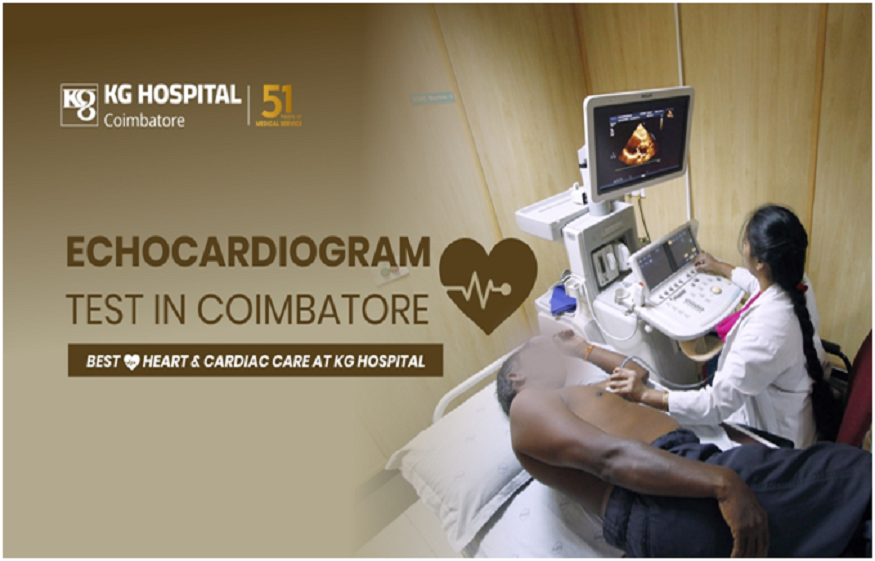KG Hospital is the Best Hearthospital/Cardiac Care medical facility in Coimbatore providing comprehensive treatment for all kinds of heart conditions.
It has specialists of long-standing repute on its rolls, available round-the-clock. It has got state-of-the-art equipmentsto precisely assess the heart conditions and provide the right cure.
Whenever a patient with heart complaints comes to KG Hospital, he/she will be subjected to initial tests with a non-invasive, painless device called Echocardiogram.
This is a device that minutely examines the:
- Heart rates and rhythm
- Velocity and direction of blood flow
- Contraction and expansion of the heart
- Condition of the heart muscles or heart walls
- Pumping efficiency
- Heart valve defect or disease
How Ecchocardiogram works:
Echocardiogram has got a wand like gadget called transducer that is placed on the surface of the chest. Transducer sends high frequency sound waves to the heart and the blood vessels. The sound waves bounce off the heart tissues and blood vessels and create echoes. Hence, it is termed as an Echocardiogram.
The echoes are captured on a computer screen as images of the beating heart, and these images are stored for examinations. By studying the echo patterns,, the expert will determine the heart conditions and in case of any abnormalities, he will suggest the suitable remedial measures.
KG Hospital always gives priority to preventive measures and in case of onset of any adverse health conditions, it initially prefers non invasive measures. Only as a last resort it would go for interventional procedures.
Before initiating any treatment procedures, the expert will explain to the patients and their attendants the condition of the heart and the likely medical/surgical course to be taken,.
Echocardiogram can detect conditions such as:
- Blood clot:or gel like lump formation in the heart walls
- Cardiomyopathy: heart muscles get affected
- Heart tumour: unwanted tissue growth in the heart
- Infective endocarditis: Infection of the heart valves
- Pericarditis: : Inflammation in the pericardium, the sac surrounding the heart
- Thoracic aortic aneurysm –Bulging of the aorta
- Valve disease: the way heart valves open and close or narrowing
- Congenital heart disease: the heart condition one is born with
Echocardiogram can also pinpoint the symptoms accompanying the these heart conditions.
Post-medication or post-surgery condition could also be learntthrough Echocardiogram.
There are several types of echocardiogram tests:
Transthoracic echocardiogram (TTE): This is the common type of echocardiogram test in which a small device is placed on the chest to send in the sound waves to the heart and blood vessels. Echoes will emante from the bouncing off the sound waves, and these echoes are captured in image form on a computer. This procedure is done quickly and painlessly. At times a dye is sent through IV to have a better view of the heart.
Transesophageal echocardiogram (TEE): This is slightly an invasive procedure in which a small device is sent to the throat to take the pictures of the heart. This procedure is done after thepatient is given a numbing solution to gargle and then sedation. From this procedure the back of the heart pictures could be obtained with greater clarity than that got through TTE.
Exercise/Stress test echocardiogram: This procedure is done to ascertain how much strain the heart can bear. For the purpose, treadmill or stationary bike is used to increase the heart beat. Depending upon the heart rates, the treatment methodology is decided. The images are taken both before and after the exercise.
Dobutamine stress echocardiogram: This procedure is applied for the patients who could not do exercise on treadmill or on bike. In this procedure medication is used to raise the heart beats to know about the stress-bearing capacity of the heart.
Fetal echocardiogram: For knowing the heart condition of the child in the womb this test is done. This is performed by moving the transducer near the belly of the expectant mother. Through this noninvasive procedure, the heart health of the unborn baby could be learnt.
Doppler echocardiogram: This test is being done to assess blood pressure and valve leakage. The sound waves when bouncing off the blood cells would have different pitch levels. Variation in these signals is called Doppler signals.
The echoes are captured in image forms on computer. These could be 2D or 3D images. After closely studying the images, the experts in KG Hospital decide on the course of the treatment.
How is Echocardiogram test done?
An echocardiogram test is done externally and is free from any sort of radiation. At KG Hospital, the best heart hospital in Coimbatore,Before taking the test the patient would be advised not to take food for specified period of time and keep away from alcohol, tobacco or caffeine.
If the patient is on medications for other health issues, he can tell the doctor about it and on his advice either continue or discontinue it for the duration of the test.
If the treadmill or bike test is suggested the patient would have to wear comfortable dress and shoes. Those undergoing the TEE test are advised not to drive the car till the sedation wears off.




